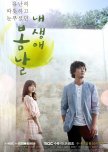
Here it is spectacular not to be spectacular - yet touching and powerful in all simplicity
"The Spring Day of My Life" fulfills the Rom+/-Com concept in a very balanced mix. The humor is not exaggerated, but has an effective, calm charm with its sometimes true-to-life, sometimes intelligent wit. The equipment does NOT want to present the latest from the high-end in terms of fashion & beauty, and the styling is also reserved. Since the KDrama comes along more on the authentic side, the 'Melo' in 'Drama' is also moderate - it doesn't come across as intentionally pathetic, but it goes straight to the heart with all its consequences. This KDrama offers a love story that has a light-hearted side and is giving pleasure while it doesn't strain any fairytale happiness. Yet it rather chooses authentic dramaturgical paths for the development of the story. Optional use for the handkerchief included."The Spring Day of My Life" presents itself as a grounded love story about a single widower with two children and a young woman who, after a heart transplant, carries the heart of his deceased wife. The New Heart with Cell Memory theme is not new to KDrama Orbit. In my opinion, however, there is nothing wrong with picking up on it and telling it anew.
In short: the spectacular is nothing spectacular here, but rather the art of telling a touching love story in all simplicity, yet surprisingly vividly. The two leads marvelous performance makes it work, too. For many, they may not be so well known, but they effortlessly take the audience by the hand. This is Cho Soo-young's first lead role (as far as I know). Kam Woo-sung, on the other hand, has been on screen since the early 1990s - his series partner was still in diapers then... He's an unorthodox, pleasantly idiosyncratic figure on the hero/antihero front. His playing comes without perfected beauty, well-placed chocolate sides and enchanting smiles, but he primarily inspires with his presence, intensity and in places minimalistic efficiency. He always embodies his roles forcefully, authentically and to touch. He doesn't have to collect sympathy points, on the contrary - he likes to show his grumpy, nagging, nasty side.
Obviously the producers were quite generous with flashbacks, but other than that, I don't think there's much to complain. If you're not looking for overly superficial, yet not overly sophisticated entertainment - this KDrama offers comforting heart-ache-smile-and-sigh.
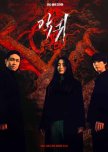
If you´re ready for what lies beyond the obvious & don´t mind a gloomy scenario, go for it
For those who don't blench from paranormal dimensions, "Revenant" is certainly a must-see KDrama. Pretty much everything is done right here. "Revenant" is a crime thriller that transcends time and space, embracing a world that is more than meets the eye and the rational mind. “Revenant” also belongs to the genre of supernatural, even horror-mystery productions. However, to reduce it to that would not do justice to this KDrama.Demons, ghosts of the deceased, people who can see such entities, and people possessed by these entities are all traditionally deeply rooted in South Korean culture. Folk religion and shamanism are still present today – sometimes more, sometimes less, sometimes not at all relevant to the individual, yet nevertheless present. "Revenant" is deeply rooted within this national culture, with Shamanistic rituals being explicitly involved here. In the mass consciousness, the supernatural world has retained a firm place over the millennia. "Revenant" specifically refers to that, (unfortunately without going into detail regarding its backgrounds.) In that sense, "Revenant" is not an unusual SBS-KDrama production for the South Korean audience. At the same time via Disney+ Streaming-Platform this series is exporting a piece of its rich national culture across the border, too - superficial as it as such may remain.
In "Revenant" Kim Tae-ri and Oh Jung-se, however, show high-end performance. Actually overall, this KDrama is in general characterized by its great casting. The acting alone makes it worth seeing. The story is unpredictable and complex, so are the relationships. Additionally, it draws from the long tradition of South Korean folk beliefs, ingeniously mixing it with a modern, rather scientific, investigative approach.
Be prepared for a suspenseful plot. The attraction of "Revenant" lies in the dramaturgically intelligent and fascinatingly presented interweaving of crime thriller and multidimensionality of being. It is obscure, too. In “Revenant” people are possessed by ghosts of the deceased, who are acting in an almost criminal manner. With conventional police investigation, murder executed by such astral beings, who materialize their intentions through their mental occupation of human bodies, are difficult to uncover.
Should you watch it? If your are ready for what lies beyond the obvious, yes. If you don´t mind a gloomy scenario, yes. It is different from your ordinary KDrama, though.
PS:
For me, however, "Revenant" is not just another highlight in a KDrama tradition that is rather fearless regarding the paranormal. The production is also one of a noticeable number of KDramas, that transcend time and space as well as this world and the afterlife, which are increasingly flooding the screens. (Especially in 2023 with i.e. "Island", "My Perfect Stranger", "See you in my 19th Life", "Heartbeat", "Durian's Affair", "Miraculous Brother" … and the year is not over yet). Ghosts, demons, reincarnations, time travel, you name it – the worlds overlap and mix, with time and space having become relative. The curtains between different dimensions are increasingly lifted. The paranormal is becoming more and more normal in the worldwide mass consciousness. Multidimensionality is a topic that people obviously increasingly like to deal with. It isn´t necessarily horrifying anymore. Not in South Korea, nor elsewhere on this planet.
In general, I find that quite inspiring, since dealing with multidimensional spaces, times and beings, has a potential to opening up new perspectives towards life. (Even if it may not all be logically satisfying yet.) It is offering a potential towards a more conscious appreciation of what makes us being human, too.
PPS:
One appealing, even salutary message that "Revenant" (somewhere along the line) would have to offer: the 'evil' intentions of the astral beings can only be as evil as the human 'hosts' allow. At some point the human has to give his or her 'Ok'. If a person has no resentment or greed and is at peace with the world, then there is not much harm wandering ghosts or astral beings in the near-earth realms can do. That would be good news, wouldn´t it... yet… compared to ghosts, eventually human beings can easily be the more frightening creatures here...

Jang Kiyong unconvincing as creative, Paris-based, free-spirited, rebellious, footloose photographer
"Now, We are Breaking Up" tries to tell a love story in reverse (e.g. it has been there already). This would be an interesting project in itself, yet...The plot is emotionally quite complex, the characters are in principle jucily interesting and ambivalent. If a KDrama can't take care of a multi-layered, complex mixture of feelings, then who can? Unfortunately, I have to say that (in my opinion) this project doesn't really work out so well with the casting.
Regarding her emotional intensity, Song Hye-kyeo is (as so often) a major factor for watching. As the heroine, here and there her reservedness, sobered by life, is perhaps a bit much. But in places this cracks open. It is this well dosed mixture and subtleness, that makes her role convincing - the experienced fashion designer in her late 30s has turned away from flirtation and rather concentrates on her work, into which she throws herself completely. Being the talented and experienced professional she is, hardly does she ever get upset by anything. ... until her encounter with the young photographer Yoon Jae-gook, that throws her (emotional) life (supposedly) upside down. Her reservedness so far operated as shelter and imprisonment at the same time. Circumstances don't really offer a chance to free herself from the corset of reason, which is protecting her deeply injured heart - never mind let herself fall and trust emotionally. This inner dynamic is not so nice to look at - or rather endure - for the viewers. But I don't think you can blame Song Hye-kyeo, as she handles this inner tension and the ambivalent moments of her complex role very well.
On the other hand (unfortunately) I don´t buy Jang Ki-yong in his role as a creative, Paris-based, free-spirited, a bit rebellious, footloose, and at the same time successful photographer. For me he behaves way too reserved, well adjusted, well-behaved - a sympathetic, dear, rich, successful boy. So unfortunately, HIS ambivalence doesn't convince me. Perhaps actor Jang Ki-yong lacks the life experience (on the rebellious side)? And since he can´t really fill this side with life, I am not convinced by the chemistry between the two leads. It doesn't get to me how the young man in his supposedly fiery manner, would be able to reignite on an EMOTIONAL level the fire of lust for life and joie de vivre (beyond work) that is still blazing somewhere deep down in Ha Yeong-eun... So the key to all further makjang doesn't really fit into the lock. Too bad. Thus the experiment of telling love in reverse didn't really work out that well.
The KDrama is not bad because of that (...though admittedly disappointing ...). On the pro side: There are freshening subplots, each with actors in good humour, who have actually won awards for their spirited performances. The setting in the creative industries is kind of charming, too. Finally, the Korean family values are (once again, but successfully as always) playing with fire on the drama front...
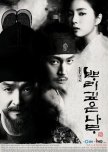
A vividly told emotional story about the creation of Hangul and its impact. Absorbing. Gripping.
Of course, this historical drama is (as many others) full of intrigues, power struggles and revenge. But King Sejong, the 4th Joseon king, who is the historical subject of this KDrama, was indeed a bright shining star in the Joseon sky. So is this KDrama.King Sejong created the Korean alphabet. Not just him alone. But this great achievement goes back to his driving force and his vision of a mature people. The story impressively tells of the bumpy road to Hangul. It also tells of how important it is as an identity-creating medium for self-confident citizens. Previously, Hanja - the canon of sheer countless characters of Chinese origin - was the country's binding writing. Not only that, but a whole range of Korean words are loanwords of Chinese origin - to this day. At the same time, this reflects the asymmetrical balance of power between the Korean dynasties and the Chinese dynasties. The use of the Han signs not only symbolizes the hierarchy among the peoples, but also within one's own people. Scribes and scholars were needed, who had the muse and time to learn these characters (more than 100,000 in total). Thus, they had the authority to interpret. It was hardly possible for ordinary people to learn. A scripture that connotes words and meanings in characters is based on a completely different concept than a scripture composed of a compact alphabet. Based on the phonetics of the Korean language, King Sejong developed an alphabet finally consisting of 14 symbols for consonants and 10 for vowels. The writing system to apply those in a way to form words and sentences can be learned comparatively quickly, even by ordinary people. What a progressive concept at the time! What a threat to the elite of scholars and noblemen!
The title "Deep Rooted Tree" refers to verses from the 'Songs of the Dragons That Fly to the Sky' - the Yongbieocheonga. This contemporary document about the Joseon Dynasty and its legacy was the first book that was ALSO written in the new Hangul writing system.
"Deep Rooted Tree" is (among many other truly exciting dramatic events throughout the story) about the impact of scripture for the people of Joseon - a story vividly told in an absorbing manner. A truly fantastic presentation. With gripping protagonists. Multidimensional. With high emotional impact.
The dramaturgical setting introduces the king (from the perspective of the male protagonist) as the bad guy. But the 24 episodes (analogous to the alphabet?) provide an impressive insight into the fascinating life´s work of that great king - embedded in the excitingly increasing momentum of the vendetta of a boy from humble origins who grows up to become an outstanding warrior and finally ends up as royal guard.
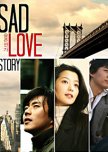
Yes, it is sentimental. Yes, it is emotionally intense. Yes it is a Love Story - KDrama style.
"Sad Love Story" marks the beginning of the wave of success that over the past two decades has carried KDrama far across the South Korean peninsula. It has mastered the art of telling drama in a way that grips the heart and doesn't let go until the end - even if some aspects are predictable and there are clichés: the journey is the goal. One is always close to the emotions of the protagonists and they move unrestrainedly up and down. More drama is always possible. Yes, it is sentimental. Yes, it intends to be emotionally intense. Yes it is a Love Story - KDrama style.Actually, "Sad Love Story" is a love story through and through. Touching in all possible directions. Obviously 'sad' too. The story navigates between 'blissful' and 'desperate' within a fascinating field of tension and relentlessly takes the audience along. At the same time, "Sad Love Story" is a study of how often supposedly small interventions (actually more like assaults) - sometimes nasty and selfishly motivated, sometimes noble and well-meaning - can mercilessly plunge one (or more) lives into misfortune. The level of pain and suffering people can endure is amazing (and encouraging). This story is fictional, but reality is full of it in all sorts of variations.
Among other things, in this KDrama one is confronted with the USA - from a South Korean perspective. That's quite interesting, too. "Sad Love Story" thus points towards a reality that people in the 21st century might be happy to forget. South Koreans and Germans probably have this in common: the presence of foreign military forces. Since the Korean War of 1950-1953, the USA, as an ally, has operated various military bases in South Korea to help defend the country in the event of a military threat from North Korea. After Japan and Germany, the United States is showing its strongest military presence with its troops stationed in South Korea. Camp Humphreys south of Seoul is the largest unit with US military personnel stationed overseas. There are several more, i.e. including Army Garrison Yongsan in Seoul, Camp Walker in Daegu, United States Navy Fleet Activities Chinhae near Busan, and two Air Force stations in Osan and Gunsan south of Seoul.
------------------ SIDE NOTE: --- "American Towns" ---
"Sad Love Story" puts the "America Town" (or "A-Town") of Gunsan in the focus of the story. The Air Force Station on the west coast is rather small, but the stationing of the US soldiers ensured that an entertainment culture geared to their specific needs was established. "American Town" in Gunsan is not the only one of its kind. They have thrived around all of these US bases since the 1950s. For example, today's hip Itaewon with its famous red-light district "Hooker Hill" in Seoul dates back to this "A-Town" culture, which specialized in entertaining the American GIs. Bars, restaurants, shops, services. Particularly lucrative: brothels... The KDrama also makes reference to the GI entertainment culture in the larger cities as it progresses. And finally also to the somewhat 'other' reality behind the dazzling GI heroes in uniform, which sometimes appears quite sobering when back 'at home' in the USA...
The "A-Town" was designated as an independent area with special "tourist facilities". It is a contractually regulated fringe zone, coordinated between the USA and South Korea - an intermediate world with its own laws. In spatial terms, too, it is located between the actual residential area (e.g. the city of Gunsan) and the air base. It consists of a cluster of bars, shops, restaurants and a few hundred small apartment buildings, each consisting of one room, kitchenette and toilet. Here lived the prostitutes, barmaids, singers...
----------------------------------------------------
In "Sad Love Story", the protagonist's mother runs a bar in "American Town", that optionally offers additional comforting services, while the protagonist's aunt is a singer in this bar. Together with other employees, they live in the immediate vicinity of each other and form a kind of community, so to speak. The "A-Town" forms the setting in which most of the characters in this KDrama grow up or live. It's a world of its own. It is at the same time an existential basis, a shackle, a flaw and the driving force to wanting to break out. It is also the place of greatest happiness and source of inspiration for the two protagonists.
Anyone watching this series should have a handkerchief or two handy. The Wheel of Fortune challengingly turns for two souls who are deeply connected in love and who mutually encourage each other to actually be true to who they are. Mercilessly the wheel turns and turns and turns... To a certain extent, actor Kwon Sang-woo ties directly into his role in "Stairway to Heaven", while actress Kim Hee-sun shines as a stoically frugal blind person who due to her disability is often helplessly at the mercy of her environment.
I admint, I forgot quite a few KDramas relatively quickly after watching. However, there are some, that due to their emotional intensity, today are still as present as if I had just seen them. These KDramas create a state of being that one doesn't really want to leave - also (or precisely because) it consistently remains in this characteristic conflict between weal and woe. And I am sure, "Sad Love Story" will also be one of those memorable ones. The soundtrack skillfully catches this situation and never tires of throwing in its leitmotifs as a pacemaker. "Sad Love Story" may be 'old', also outdated in format and style, but at the same time the series is timeless. In its mercilessly stirring mixture of love story and makjang it´s one of several masterpieces of the early 2000s that offer Love-Story-telling in its unique KDrama way. It is not about ´watching´ a story from the outside, but letting it in and empathizing. However, you have to like this style. Also the repeated holding on to the emotional key scenes. E.g. the topic itself has long since been told, but so that it also emotionally reaches the audience, the shot stays a little longer...
It should also be noted that the mixing with the US military and the scenes in the USA required a comparatively active participation of ´American´ actors. Those who also speak Korean (for an uncomplicated, smooth organization on the set) are probably rather rare. The talented ones among those obviously even more so. In this respect, the production inevitably breaks down a bit in terms of its acting quality.
And last but not least: In general, the early KWave productions are still more soap-like-style and not comparable to those Netflix (co-)productions over the past 6 years. Being spoiled by recent production quality, one can certainly linger on one or the other detail, as well as on the abundance of episodes (i.e. more and more and even more maybe unnecessary emotional loopings for the actual story to be told). If you have a problem with that, I would not recommend this KDrama.
"Sad Love Story" is for lovers of mercilessly intense emotional, slow-paced Makjang Love-Stories with plenty of heartache and a clenched fist in the pocket (and sometimes in the face).
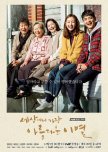
Very humane. Tangible. Touching, yet not maudlin. Sad, yes. But unpretentiously radiating, too.
"The Most Beautiful Goodbye" is a KDrama that consists of only 4 episodes. However, they have it all and are completely sufficient to leave their mark in the sand. We are confronted with the limits of healthcare system - when medicine no longer has a solution to offer and people are left with themselves and what they are: mortal beings. In ruthless directness, the viewers are confronted with what many people (all over the world) might at some point face in one way or another.The family here is not particularly rich and not particularly poor. The individual protagonists are not particularly successful and have not particularly failed. Everyone lives their (South Korean) life as best they can. Not very happy and not very unhappy. With a tendency not to not be so happy. But they are actually not really unhappy either. In fact, everything could be quite nice, but everyone is just too busy with themselves. The WE becomes self-evident and rather annoying... until the day the finitude of being was knocking on the door...
However, hello-wake-up does not imply everyone starts reinventing themselves, overcoming their weaknesses and becoming better people. It does, however, force them to reflect on what they have and what they have forgotten (to love) (consciously) despite everything being taken for granted. In stumbling everyone is searching for an expression of their own feelings. At least they try to be a little bit more alert about what is going on in their life.
Very humane. Tangible. Touching, yet not maudlin. Pretty close to life. People are clumsy, speechless and helpless, as akward as it gets. It is a lesson in compassion, triggering your own experiences, when it comes to similarily unprepared being confronted with any form of (unwanted as it is) final farewell.
Sad, yes. But unpretentiously radiating, too.
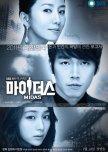
Balancing genius, intuition & healthy grounding in an elite jungle of an addictive financial world
How far can you go? The focus of these KDramas is greed for BIG money, which has long since lost any reasonable connection to life and people. It's about stock deals by the super-rich, insider trading, short selling, mergers and acquisitions.Hiding behind the title "Midas" is the legendary story of the ancient King Midas. It is said that as a child, ants would put grains of wheat in his mouth while he was sleeping. He was later granted a wish by Dionysus, wishing that everything he touched would turn to gold. The consequences though were life-threatening, because actually everything he came into contact with turned to gold, including food and drinks... The story of the KDrama operates both with the dictum "to have a golden hand", which is inspired by this legend, and with the psychoanalytic concept "Midas complex", which has proven itself in connection with pathological greed.
The protagonists in "Midas" have an offensive urge, almost addictive, to make even more profit with daring investment strategies, sometimes risking to lose the ground under their feet and maneuver themself into existential situations. This KDrama is about the challenge of balancing genius, intuition and a healthy grounding within the elite jungle of an addictive financial world. Thrilling story, complex character studies and emotional rollercoaster are guaranteed. In this world where money, intelligence and high speed set the tone, the intuitive feeling for the right timing prevails. "Midas" broadens the horizon from the (rather usual) Jaebeol family intrigues and inheritance disputes, which also have their place here, to - without regard to losses - partly illegal machinations in the financial world.
"Midas" is sketching a world of high risk and high numbers - abstract, fast pace, fashionable, cold. Yet it is an emotionally intense in-depth study about temptation, including space and time for morals. However, a spot here and there, where the warm and tender wind blows, is given, too. Some call it love...
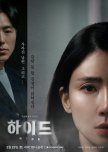
Dramaturgically opaque fabric of a multi-dimensional plot tapestry
At first glance, "Hide" is none of the spectacular KDrama productions, yet on the solid side of KDramas, I consider this production first class.We get an extremely complex crime thriller in which white-collar crime is intelligently mixed with many other criminal activities as well as incitement to and covering of criminal activities, plus fraud and adultery and even more. It is based on the Welsh television series “Keeping Faith” from 2018. However, the KDrama freely unfolds its own, definitely South Korean-tinged storyline. (There, of course, the Jaebeol shouldn't be missing, ...who, together with their henchmen, are significantly assigned the role which a gangster clan played in the Welsh series...)
“Hide” definitely offers a dramaturgically opaque fabric, where motives and entanglements reach beyond 'today', too. Continuously weaving surprising twists into the multi-dimensional plot tapestry turns out to be the great strength of “Hide”. Thanks to the entire production team in front of and behind the camera the story grippingly enfolds…and enfolds… and enfolds…
And in true KDrama-like style, no character remains one-dimensionally black or white - no matter how questionable or malicious they may act. Likewise, sooner or later we can relate to the motives of the different characters and why they were drawn into dishonest or even criminal actions. (Even if you don't have to approve of the actions, let alone like those characters.)
Complex. Dense. I would recommend this gripping crime thriller to fans of the genre, who like it with a topping of Korean emotionality.
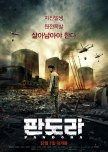
A disaster movie, yet using emotional + vivid suggestive power in the tradition of anti-war-movies
"Pandora" is a disaster movie.I don't really consider myself a fan of this genre, which focuses on mass panic and adrenaline.
However, I consider this KMovie particularly valuable.
In this case I think the makers have succeeded in doing something similar to what anti-war movies try to achieve: deterrence by vividly conveying the threatening horror. In respect to the scenario of a nuclear catastrophe the movie applies emotional and vivid suggestive power, at the same time making people think and possibly question the sense and usefulness of highly dangerous nuclear power plants.
In view of the consecutive radical change of South Korea's nuclear policy six months after "Pandora" was released, one could say: the project was worth it. (It would probably be too daring to talk about causality, but it could be considered a noticeable correlation...)
The 2016 KMovie picks up on the 2011 Fukushima nuclear disaster and, against this background, develops a story that is comparable by South Korean standards. South Korea is the country with the highest population density in the immediate vicinity of its nuclear power plants. However, due to its insular position, a realistic evacuation plan in the event of a disaster is a major problem. With the movie "Pandora" the lid of the legendary box is shaken. In this case, a nuclear power plant on the East Coast suffers earthquake damage and radiation leaks, similar to Fukushima 5 years earlier. The film fictionally exercises the processes in the event of such a catastrophe (or a comparable one) and comes full circle with a deliberately touching scene in which Kim Nam-gil makes an emphatic plea against nuclear power in his usual impressively passionate way.
Regarding such critically oriented material, the production obviously had difficulties with its financing - in South Korea the lobby of the nuclear industry is as powerful as anywhere else. Nevertheless, the ambitious project could be realized through crowdfunding.
------------------------ SIDE NOTE: --- Sobering facts/outlook on nuclear power plants in South Korea ---
"Pandora" was released in December 2016.
In early summer 2017, as one of the existing South Korean nuclear reactors was actually scheduled to be shut down, President Moon Jae-in announced that the country's nuclear-focused energy policy would be stopped and that the country would instead steer towards a nuclear-free era. Accordingly, plans to build new reactors or extend the life of existing ones have been abandoned. A sign of hope?
However, by the autumn of the same year already, the government's political commitment was no longer valid. The nuclear lobby has actually been able to exert such pressure (the President's faction not having a majority in Parliament....) and prevail that new power plants were going to be built again.
South Korea's nuclear companies make a lot of money by exporting their self-developed reactors. The companies want reference projects in their own country... it is as simple as that...
As far as the people are concerned: According to a survey by the polling institute Realmeter in 2018, 61 percent of adult South Koreans still firmly support their president’s original nuclear phase-out course. Another 10 percent tend to do so. Yet, the lobby as so often has more to say...
... To date, South Korea covers a third of its electricity needs with 24 nuclear reactors.
... There are always earthquakes on the peninsula...
------------------------
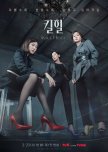
Lee Hye-young and her role operate as backbone and heartbeat of this KDrama
"Kill Heel" is set in the milieu of teleshopping. The pace is leisurely, calm. The light is dimmed sort of. The focus is on 3 women. Their heels are dizzyingly high.At first, the story leaves the audience feeling a bit lost. Just one thing is obvious: the competition in the production company is extremely tough. But over time, the three protagonists get more profile and the story heads in it´s direction.
The driving force that really makes the KDrama worth seeing is, above all, veteran Lee Hye-young, who has experienced a real revival in recent years. Here, in the ambivalent character of Gi Mo-ran, she gave another marvellous performance! In my eyes she (and her role) operate as backbone and heartbeat of this KDrama
It's about intrigues, struggle for survival, hurt feelings and old traumas. The relationship dynamics between the 3 women intelligently intertwine and dissolve in a subtle but unexpected way.
"Kill Heel" has a very unique look and feel to it and comes along with a peculiar pull effect. There is suspense, but at the same time the suspense isn't setting the tone. Sometimes something seemingly builds up, but then everything is completely different again. And after 14 episodes it's over. What a pity, actually...
------ SIDE NOTE: ---Teleshopping---
I wasn't really aware of the impact of teleshopping until now. In Europe within homeshopping Germany is the leader, when it comes to sales figures through teleshopping (compared to online-shopping) . In South Korea, teleshopping accounts for almost 50 percent of home shopping. Similar to sales parties in private circles (Tupper & co.), teleshopping thrives on impulse purchases and customer loyalty, which are promoted by a harmonious, interactive, relaxed sense of community. Within the virtual television community, it is the presenters who foster this intimacy with their virtual customers. Women in particular buy in teleshops.
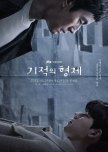
Powerful plot. Solid & unique. Four-dimensional. An enrichment on the KDrama crime thriller market
A solid thriller, laid out across time and space. The fourth dimension has a hand in the investigation. There's a bit of magic involved too.You can expect an suspenseful, opaque story with edgy characters - in particular a cheeky, blustering, stroppy anti-hero as male protagonist. As a writer he is ambitious but probably rather untalented. However, he is also someone who doesn't easily give in and doesn't like to be fooled. And there is this delicate, gifted, mysterious stranger crossing his path…
The criminal act and the perpetrator as such may seem rather familiar, sort of. But pretty much everything knitted around this crime is off the beaten track! With strong characters and powerful plot. An enrichment on the KDrama crime thriller market! With time and space becoming relative...
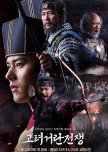
KDrama sure can do historical drama. Goryeo-Khitan War is another prime example of this
"Goryeo Khitan War" is a historical epic intended to honor not only the historically exceptional achievements during the Goryeo-Khitan War, but also half a century of KBS (Korean Broadcasting System). And it does. Perfectly done in all instances and scales. What's even more fascinating is how it succeeds to fill ca. 1,000 years long bygone history with life in a gripping way - close to the facts and colorfully embedded within the midst of the political milieu surrounding the royal court.If I hadn't accidentally stumbled into the filming set in the early summer of 2023, this thoroughly historical KDrama might have slipped a bit back on my list. But this personal connection eventually made me more curious. And now I'm full of praise.
32 hours long history lesson - history can be told so vividly… Complex personalities, an even more complex political context and a highly demanding challenge of war come very close to the audience. You don't have to be of Korean origin to be inspired - by its heart, intelligence, daring, perseverance and humanistic ethos. It is not about simply enumerating historic facts. It is colorful, complex, character driven – what happened about 1.000 years ago comes as close as it gets: Those years around the turn of the millennium at the beginning of the 11th century, when the 8th king of Goryeo - the then still quite young Hyeongjong of Goryeo - had to face the successive invasions of the numerically superior, Khitan of the Liao Dynasty.
What happened way back then obviously has happened a long time ago, but actually many policymakers today could be inspired and encouraged by the political attitude that is being exercised here. Even though facing the acute threat, this canny, courageous, responsible king isn´t willing to simply fly on sight, but rather acts cool-headed and with foresight. He is someone who does not shy away from complex, fundamental, unpopular, but far-reaching, forward-looking structural reforms... And then there is a government official, who not simply and opportunistically cares about himself, but about the cause - about the people, the country and the ´good´ (even if uncomfortable) decision.
The book "Sweet Rain in Winter" by Gil Seung-soo certainly contributed significantly to an excellent script. The historical greats, both large and small, impressively come to life. Romance is secondary, bromance is the theme here. By this I mean less the homosexuality of Mokjong, the 7th king of Goryeo. Rather, the intense struggle and relationship between King Hyeonjong and Gang Gam-chan, a scholar, government official, mentor of the king and crucial military commander during the third Goryeo invasion.
The KDrama offers a distinctively Korean (chapter of hi)story. One with a lot of pathos and even more ethos. One about people and their relationship dynamics, about their character strengths and weaknesses.
KDrama sure can do historical drama. Goryeo-Khitan War is another prime example of this.
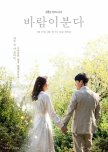
Years after the “Yes”-word, and yet a substantial love story, touching without being kitschy
"The Wind Blows" sounds quite inconspicuous, but it is not. It turns out to be a moving love story. Actually it is rom+/-com that starts exactly where other love stories end: with the ´yes´ word. The KDrama tells of what can happen when the butterflies (in the face of the new) are followed by ordinary years of shared, sometimes painful everyday life relationship... But that's not why love has to be gone missing. On the contrary... yet eventually, love might find it harder to take its space...The title "The Wind Blows" refers specifically to the moment when the two protagonists first met many years ago. At that time the wind was blowing. What started then is not over yet. Figuratively, the wind is still blowing. However, the everyday challenges of aging have now added to their married life. The two must meet those challenges. It is rather common that one may be tempted here and there to make solitary decisions instead of communicating. One may have doubts if there still can be a way together. Every now and then it seems that such a common path is not (or no longer) possible. And then, maybe, one or the other might open up again.
"The Wind Blows" tells a serious and profound story about a love relationship that has grown out of the first romantic phases. Generally, this is less wanted on screen, as it inevitabely comes with problems, arguments and breakups. (Somehow that's in the nature of relationship - the constant rubbing against each other in a wide variety of ways actually leads to feeling/sensing yourself and the other person in the first place... it doesn't work without it. Does it?) In this KDrama, problems, arguments and breakups are all in, too. But so is love. (...as so often, although we might fail to notice in the midst of turmoil.)
I don't want to hide the fact that Alzheimer's disease is involved here as a stab in the back and at the same time a second chance. Against this background, the story manages to tell sensitively, empathetically and at times ruthlessly about the bumpy stretches of a patient love that has been and remains there over time - even if it is experienced differently over the course of the years, perhaps sometimes cannot be shared and also has changed its forms of expression over time.
The sensitive processing and the emotionally intense acting (great: Kam Woo-sung and Kim Ha-neul) are KDrama quality at its finest, which has once again proven itself to be just perfect for dealing with such a complex subject, which is difficult in several respects. A substantial story, touching without being kitschy.
(Well, I didn´t need the slightly shallow subplot and few unnecessarily humorous sequences here and there. Yet they obviously tried to loosen things up... well...)
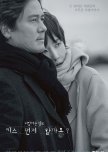
A three-dimensional, grown-up love story, sensitively told and spiritedly acted
When people have lived for more than four decades, they are usually disillusioned in many ways. Hope for romance and love has given way to various, quite specific experiences... and these are inevitably paved with disappointment and suffering, too. However, it´s not necessarily too late for a new love. It might be different, though. More grounded. Honest. Upright. Less games. Sincere closeness and warmth become more important than romantic squabble. The time ahead is finite. And you no longer expect a fairy tale full of magic, but rather wish for true moments, a safe place to catch your breath and recharge your batteries. Reliability. Trust and emotional intimacy.The protagonists in "Should we Kiss First" have all been through life for some time. The two main characters have had children and lost them again, have been married and divorced, lived more or less honest but empty lives. SHE has been a stewardess for 20 years and suffers from insomnia. HE is a co-founder of an advertising agency and has cancer. Neither of them want to be alone. Neither of them want a relationship. Hm. Difficult. Their best friends each want to pair them off ... and at last are successful. However - being in makjang KDrama Land - the past of the protagonists gets involved in the present and triggers a lot of turbulence.
"Should we Kiss First" focuses on two adults who (re)experience love in a way they never expected. Love is not primarily supple, sexy and redeeming, but presents itself as irrational, brittle, stubborn and complex. As such, it demands one thing unconditionally: complete surrender to this feeling, which remains in spite of adversities, yet does not solve any problems. However gives the necessary strength to face them.
Does this power come from the love you experience from someone? Or from the love that you give yourself? The beauty of this KDrama is placing the emphasis on the fact that it is your own radiance which makes a difference. The love we open up to and give in to makes the difference how we experience life, or what options we recognize and choose... It's about giving in to your feelings, letting them be (even if you rather not put up with it) and trusting them.
The story is told in different nuances - sometimes humorous, sometimes profound, sometimes tender, sometimes playful, sometimes harsh, even fists are flying at times. Enjoying the moment to the fullest and the pure love of life have just as much space as the desolate moments of emptiness, embarrassment, destructive anger and listless lethargy. The dialogues are carefully chosen down to the last detail. And then there are the subplots, that round the story off.
A three-dimensional, grown-up love story. Yes, once again a story about love, but not cheesy. Instead, the story is sensitively told, spiritedly acted and filled with a love for detail. On top of that, a story full of sometimes subtle, sometimes explicit wisdom. A KDrama that doesn't sugarcoat anything, yet feeds you with a satisfying sigh.
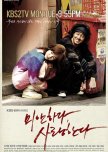
Truly touching. It makes you angry and concerned, too. You will ride in a rollercoaster of emotions.
"Sorry, I Love You" is an early masterpiece of proven KDrama art, which once again juggles the injustices of ordinary people with sensitive finesse in an emotionally draining manner - against the background of a South Korean sensitively reinterpreted Romeo & Juliet love story.Humiliation, exploitation, devaluation are the everyday life of the socially weak, while the celebrated, influential contemporaries seem to know no shame in their arrogance and haughtiness.
So Ji-sub hauntingly embodies subtly controlled, concentrated, suppressed anger. In the character of the protagonist, hate and compassion, love and indifference are combined in a fatal mixture. He becomes an incalculable time bomb that could be activated at any time.
Of all the early Makjang-infused KDramas, "Sorry, I Love You" is one of my favourites. Even if 'love' is bold in the title, the story doesnt´t romanticize it in a striking and cliché-like manner, yet the KDrama tells the story understated elegantly, but no less touchingly and also sincerely (...and of course dramatically tangled in a complex way.)
There is brother rivalry, revenge, swapped babies, secrets, complicated feelings, accidents, illnesses - the whole program prepared in a new mixture. The KDrama expresses in a concentrated, mostly subtly restrained (and thus even more vehemently impactful) emotional force how arbitrary, mendacious and unfounded it is that some people believe, they are 'justifiably' above others and thus have the given right to make decisions about them.
The KDrama uses a rarely found dramaturgical move to give the emotional force of the collision of two worlds even more power: the protagonist was put up for adoption abroad as a child. So he not only grew up with the feeling of not being wanted, but also with other western socialized (Australian) values. Subservience and humility are not among his strengths. He tends not to respect people in authority, or at least the authority has to prove itself as such first. He often acts disconcertingly strange. In South Korea, however, manners and respect for the elderly and higher ups are everything. Since he's Korean, people hardly pardon his naughtiness (as they would an obvious foreigner).
A touching story that makes you angry and also concerned. You will ride in the rollercoaster of emotions - while one emotional looping has not yet been completed, you are already on the way to the next.
-------------SIDE NOTE: ---overseas adoption of South Korean children---
...is a sad story that began after the end of the Korean War. Since then, around 200.000 children have been adopted, primarily from families in the USA, but also from Canada, Australia and Europe. First they were war orphans, then children from poor families, but then also children from illegitimate or divorced backgrounds. In the 1970s and 80s it became a profitable business. On the one hand, the government imposed veritable quotas on the adoption agencies. On the other hand, demand from western countries was high. Corruption flourished in places - the children were given away to the highest bidder. A halt to adoption in the face of international criticism was followed by renewed liberalization of legislation - as a result of the (lack of) adoption policy of the past decades social system was not prepared for the number of 'orphans' (actually: abandoned children).
Most of those ´orphan´ children have now grown up. There are quite a few, who organize themeselves and advocate for change. They want others to spare the trouble of growing up in a country, in a culture in which they are seen as strangers and bullied for being different and confronted with racial prejudice. In many cases they remain strangers and outcasts, as their country of origin cannot be/become a home for them either. The 'hatred of the homeland' is probably rather high among foreign adopters. In 2004, when the KDrama was released, the mood in South Korea was sensitized to the concerns of foreign adoptions and so a critically discussed topic was filled with 'life' by this KDrama. In 2006, an adoption day was introduced in South Korea and finally, since 2007, the numbers have shifted: there are now more domestic than foreign adoptions in South Korea...


 9
9 38
38 15
15
















